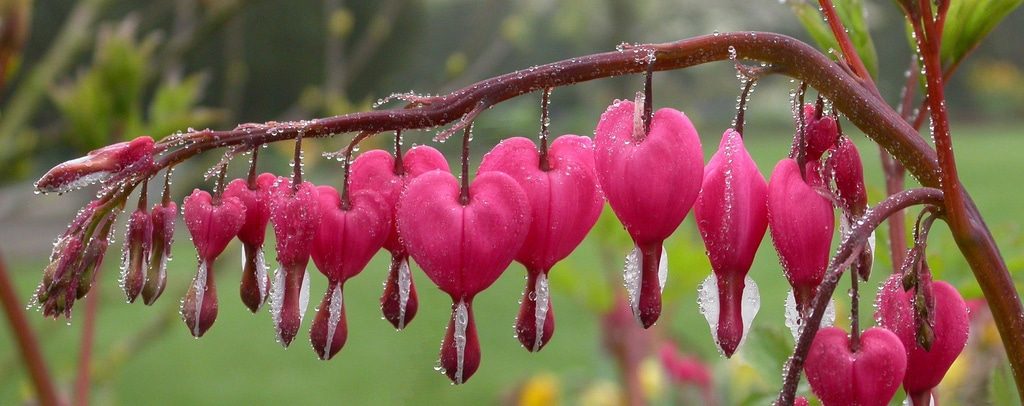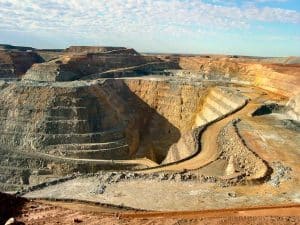5 Eco-Conscious Gifts of Love for Valentine’s Day
February 14 is Valentine’s Day — a longstanding tradition where we show love and affection to family and friends. But did you know that the traditional Valentine’s Day gifts come with a hefty environmental and human cost? The good news is that there are plenty of environmentally friendly, humanitarian ways to show your special people that you care — about them AND the planet.
Flowers

Traditional cut flowers require a significant amount of water to grow and transport, and also are doused with a hefty amount of chemical pesticides. 80% of traditional cut flowers are imported, with 90% of those imports coming from Latin America, where pesticide regulations are nonexistent. As a result, 65% of flower workers in Colombia have compromised health, and Latin American groundwater and waterways have become polluted. While there are many alternative ideas for cut flowers, giving your sweetie a Bleeding Heart to plant in the garden is the Valentine’s Day win. These beautiful perennials are hardy, drought resistant, erupt profusely with heart-shaped blossoms every spring, and keep their vibrant green leaves until the first frost. Not only is a Bleeding Heart an environmentally conscious gift, it is also thoughtful, long-lasting, and a symbol of deep and abiding love in both American and British cultures.
Chocolate
 Chocolate is one of the most traditional Valentine’s gifts — and one of the most disastrous. Cacao — more commonly referred to as cocoa — can only be grown up to 20 degrees north and south of the equator, and most of the world’s chocolate is grown in Africa. Because global demand of chocolate is expected to double by 2050, farmers are struggling to meet demand and have turned to unsustainable farming methods. Planting cocoa trees in full sunlight yields more bountiful, but lower quality crops, and it also encourages weed growth and pest infestation, which requires more pesticide and chemical application. Cocoa farming has led to major deforestation and soil erosion, and has destroyed wildlife habitats. While governments have tried to protect rainforests after witnessing the destruction that cocoa farming has wrought, farmers continue to illegally clearcut forests to plant more cocoa. And if that’s not bad enough, many African cocoa farmers utilize children to harvest the trees. Most of these children are between the ages of 12 and 16, but children as young as 5 have been found working the fields. These children often work 12 hour days, their wages are typically well below the poverty line, and they frequently experience abuse. The safest way to buy chocolate is to buy organic, fair-trade and rainforest certified chocolate. Organic chocolate is grown in Latin America, where there are no documented cases of child labor. Fair-trade certified ensures that the workers earn a fair wage, and rainforest certified ensures that the cocoa was grown using sustainable methods.
Chocolate is one of the most traditional Valentine’s gifts — and one of the most disastrous. Cacao — more commonly referred to as cocoa — can only be grown up to 20 degrees north and south of the equator, and most of the world’s chocolate is grown in Africa. Because global demand of chocolate is expected to double by 2050, farmers are struggling to meet demand and have turned to unsustainable farming methods. Planting cocoa trees in full sunlight yields more bountiful, but lower quality crops, and it also encourages weed growth and pest infestation, which requires more pesticide and chemical application. Cocoa farming has led to major deforestation and soil erosion, and has destroyed wildlife habitats. While governments have tried to protect rainforests after witnessing the destruction that cocoa farming has wrought, farmers continue to illegally clearcut forests to plant more cocoa. And if that’s not bad enough, many African cocoa farmers utilize children to harvest the trees. Most of these children are between the ages of 12 and 16, but children as young as 5 have been found working the fields. These children often work 12 hour days, their wages are typically well below the poverty line, and they frequently experience abuse. The safest way to buy chocolate is to buy organic, fair-trade and rainforest certified chocolate. Organic chocolate is grown in Latin America, where there are no documented cases of child labor. Fair-trade certified ensures that the workers earn a fair wage, and rainforest certified ensures that the cocoa was grown using sustainable methods.
Cards
Paper cards are an environmental nightmare. Paper accounts for 20% of global wood consumption, with 93% of it being from virgin pulp. Add to that the vast amounts of water required to grow trees for paper production, the thousands of gallons of fuel used to transport the wood and the paper, and the chemicals and toxins used in the inks printed on those cards, and it’s clear that paper greeting cards are a tradition that we should forgo. Instead, show your loved ones your affection with an e-greeting. E-cards use no paper, require no transportation, and are easily personalized with your special message. Bonus: many are free, like Blue Mountain. With the money you save on greeting cards, you can easily afford that pricier, organic chocolate.
Diamonds

A large percentage of global diamond mining is detrimental to both the environment and human rights. In Africa, where 65% of the world’s diamonds are mined, vast amounts of land have been completely deforested, leading to erosion and loss of previously farmable land. In addition, these vast, abandoned mines are perfect breeding grounds for mosquitos, which spread malaria and other water-borne diseases. Diamond miners earn less than $1 per day, and up to half of those workers are children. Diamond miners are often abused and tortured, and millions of deaths have been attributed to the illicit diamond trade. Fortunately, there is a solution. Brilliant Earth is committed to only selling diamonds that are Beyond Conflict Free. According to their website, Beyond Conflict Free goes above and beyond the current industry standards to guarantee that their diamonds originate from pure, ethical sources. Their ethically sourced diamonds originate from mines that adhere to strict labor, trade, and environmental standards.
Gold
 The vast majority of gold mining is an extremely environmentally destructive practice. For each gold ring, over 20 tons of rock and soil are dislodged and discarded, bringing with it cyanide and mercury that are used in the mining process. These toxins enter waterways, polluting our water supply and harming marine life, and elemental mercury is released into the air, compromising air quality. But while the majority of gold mining is done without any regard for the environment, there is a movement to change this practice. When purchasing gold jewelry for your sweetheart this Valentine’s Day, look for gold mined by artisanal and small scale miners. Some safe retailers include Amalena, Brilliant Earth, and Green Oro.
The vast majority of gold mining is an extremely environmentally destructive practice. For each gold ring, over 20 tons of rock and soil are dislodged and discarded, bringing with it cyanide and mercury that are used in the mining process. These toxins enter waterways, polluting our water supply and harming marine life, and elemental mercury is released into the air, compromising air quality. But while the majority of gold mining is done without any regard for the environment, there is a movement to change this practice. When purchasing gold jewelry for your sweetheart this Valentine’s Day, look for gold mined by artisanal and small scale miners. Some safe retailers include Amalena, Brilliant Earth, and Green Oro.
While traditional Valentine’s Day gifts are environmentally unfriendly, Valentine’s Day doesn’t need to remain an eco-travesty. With a little bit of effort and thoughtfulness, we can show love to both our sweetheart and planet at the same time. Happy Valentine’s Day!
